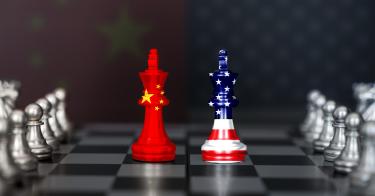While appearing at a recent congressional hearing on China, former deputy national security adviser Matt Pottinger testified to what many in our political class have failed to acknowledge: Although America has long sought peace and cooperation with China, “it does us little good to repeat again and again that we aren’t seeking a new Cold War when the [Chinese Communist Party] has been stealthily waging one against us for years.”
He is right. It is time to acknowledge a simple reality: The Chinese Communist Party, both through its words and actions, has made it clear that it intends to overtake the United States and restructure the global order in its image.
The People’s Republic of China has viewed the U.S. as a strategic rival and long ago deployed cold war tactics against us, even as America opened its economy and its borders in a misguided engagement strategy.
A new Heritage Foundation special report, “Winning the New Cold War: A Plan for Countering China,” recognizes that China is an adversary and that the U.S. has entered a new cold war, though it will differ in important ways from the last one. China is, in some ways, a more capable adversary than the USSR ever was. (The Heritage Foundation is the parent organization of The Daily Signal.)
A cold war is defined as a “condition of rivalry, mistrust, and often open hostility short of violence,” generally applying to two global powers locked in an escalating rivalry across multiple domains—economics, technology, diplomacy, geopolitics—but absent direct military conflict.
“Winning the New Cold War” assesses the current situation between the U.S. and China and offers specific policy recommendations to deal with China’s increasing threat. The report consists of three parts.
Part I examines the state of the China-U.S. rivalry and the respective strengths and weaknesses of both countries. Guided by contributions from over two dozen experts inside and outside The Heritage Foundation, the report assesses that China is fully intent on overtaking the U.S. as the leading global power, offsetting U.S. military advantages in the Indo-Pacific region, further centralizing control in the hands of the Chinese Communist Party, and increasing domestic repression—including the ongoing genocide against the Uyghur Muslim minority in the province of Xinjiang.
Meanwhile, the U.S. has several internal challenges to contend with, from an eroding military advantage due to outdated equipment, depleted supplies, and dwindling recruitment, to an overregulated economy undermined by counterproductive, left-wing environment, social, and governance policies that saddle our organizations and industries and that are often exploited by China.
In Part II, the report examines 48 fault lines within U.S.-China relations and offers over 100 specific policy recommendations meant to protect the homeland, secure and advance U.S. prosperity, reorient America’s defense posture, diminish the Chinese Communist Party’s influence and hold it accountable for its actions, and help the United States exercise global leadership.
The section on protecting the homeland focuses on policies necessary to safeguard the American people from malicious Chinese activities inside the United States. Key recommendations include restarting the Department of Justice’s China Initiative to crack down on illegal Communist Party operations in the U.S., restricting Chinese entitles from purchasing U.S. land with strategic value (such as near military bases), and banning Chinese lobbyists and Communist Party apps like TikTok that pose espionage risks.
The section on securing and advancing U.S. prosperity proposes changes to the Committee on Foreign Investment in the United States and how it screens inbound Chinese investments in the United States. Among other things, it examines ways to reduce U.S. reliance on Chinese supply chains for semiconductors and the critical minerals used in the manufacture of those semiconductors and other technologies, as well as ways to create a friendlier business environment to induce companies operating in China to return to the United States.
The section on reorienting America’s defense posture contains policy guidance for realigning U.S. national security spending with its top national security priorities, which include deterring China’s attempts at global dominance. The U.S. must deliver on weapons sales to Taiwan that are facing recurring delays, strengthen its deterrence posture in the Indo-Pacific, and rebalance foreign assistance spending to its priority theater, the Indo-Pacific.
The section on diminishing the Chinese Communist Party’s influence and holding it accountable examines ways to hold China to account for aggressive trade practices that undermine U.S. prosperity, looks at expanding controls on the export of sensitive technology to China, and promotes the imperative to further investigate the origins of COVID-19.
Finally, the section on exercising global leadership examines actions the U.S. needs to take in other key theaters to demonstrate leadership and unify allies and strategic partners to confront Chinese communist threats. These include developing an Atlantic Strategy for the Western Hemisphere, prioritizing the emerging partnership with India, enhancing engagement with Southeast Asia and the Pacific Islands, and further developing the Quad group of allies of Australia, India, Japan, and the United States.
In Part III, the special report examines steps necessary to implement the plan. It emphasizes cooperation and coordination between the executive and legislative branches, federal agencies and law enforcement, state and local governments, U.S. allies and partners, and the private sector.
The Chinese Communist Party has made it clear that it intends to restructure the global order in its image and it does not intend to let United States stand in its way. Avoiding this fate will require a comprehensive plan of action, including going on the offensive to hold the People’s Republic of China accountable, diminish its capacity to harm the U.S., and win the New Cold War.
This is no small task, but America’s very future depends on it.
This piece originally appeared in The Daily Signal




